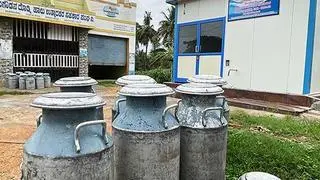Though Egypt has included India among the list of nations it buys wheat from, exporters are worried that Cairo’s sanitary and phytosanitary measures, fixed in 2019, could be a big impediment to the shipments.
It is not just phytosanitary measures that worry exporters since trading with Egypt will be tricky with chances of the importer at the delivery port acting spoilsport. They feel some of the conditions are loaded against India.
‘Talk with gun on table’
“One of our traders in Dubai says you have to negotiate with Egyptians putting your gun on the table. The Russian have mastered it. No one in sure how Indians can handle this,” said a New Delhi based trade analyst.
On April 15, Egypt included India in the list of wheat buying nations and New Delhi said it would try and export three million tonnes (mt) this fiscal. India is trying to export at least 10 mt of wheat this fiscal compared with an estimated record of 7.85 mt last fiscal.
Protein content
Besides including India in its buying list, Egypt has included a provision of “other origins” wherein the protein content in wheat should be 11.5 per cent, though it could be acceptable to the level of 11 per cent. Compared to Ukraine and Russian wheat that have protein content of about 12-12.5 per cent, Indian wheat’s protein content is 11.5-12.15 per cent. Egypt had been depending on wheat from these two erstwhile Soviet Union members until Russain troops entered Ukraine on February 24. It had also resulted in wheat prices surging sharply. The foodgrain’s prices have increased 37 per cent since the beginning of the year with most of the gains coming after the war broke out.
Currently, benchmark wheat futures on the Chicago Board of Trade are quoted at $10.75 a bushel ($395 a tonne). According to the International Grains Council, Argentina is quoting wheat at $439 free-on-board (f.o.b), EU France grade wheat is ruling at $448, US Hard Red Winter wheat at $501 and US Soft Red Winter wheat at $437.
“The phytosanitary conditions are tough. There are two issues to this. Only phytosanitary declaration may not be enough,” said Delhi-based exporter Rajesh Paharia Jain.
‘Compliance must’
Asked about the fears expressed by traders, official sources said the phytosanitary conditions are “country-specific requirement and compliance is a must”.
Getting the phytosanitary certificances (PSC) from the National Plant Protection Organization (NPPO) is a normal procedure and NPPO will do the needful if exporters send their products based on the quality requirements of the importing nations. The Commerce Ministry will assist in case any exporter faces any problem, the sources said.
Jain said there was always the danger of the consignment being rejected at the port of delivery since the condition of import is not “port of loading”. “Can the government ensure that there will be no rejection of the consignments at the port of delivery,” he wondered.
The Adani ‘experience’
This concern is justified since any dispute over the quality or protein level content will result in the price being lowered, as per Egyptian Agriculture Ministry’s notification.
Jain and other exporters point out how the Adanis faced rejections in 2003, despite diplomatic efforts to resolve it. “This is still fresh in exporters’ mind,” Jain said.
Exporters said Egypt has included India, perhaps, to lower the price bids for its tenders. Cairo had been primarily depending on Black Sea region wheat from Russia and Ukraine, which contributed 60 per cent and 22 per cent of total imports by it.
Last week, Egypt signed deals to import 3.5 lakh tonnes of wheat from France (2.4 lakh tonnes at an average price of $451.75 a tonne f.o.b), 50,000 tonnes from Bulgaria at 449.50 a tonne and 60,000 tonnes from Russia at $460 a tonne. Freight will likely cost between $30 and $50 a tonne.
Quoting low price
Egypt decided to buy wheat at the tender after cancelling the previous two on high bids as its reserves have dwindled to a little over 2.5 months. “Despite the fears, we are quoting a very low price in the global market at around $350 a tonne. Freight will at least be $70 a tonne with ships having to pay $10 a tonne to cross the Suez Canal,” Jain said.
Other exporters, too, say there is scope for Indian shippers to raise the offer price with wheat prices rising sharply in the global market. “Our problem is that we are trying to undercut one another,” says a South India-based exporter.
Earlier this week, Reuters quoted Ahmed El Attar of Egypt’s Plant Quarantine Department as saying that “just because we approved the origin doesn’t mean we accept anything. There are technical conditions set by the plant quarantine department.”
Two objectives
India is trying to push wheat in the global market with two objectives. One is to make headway as a reliable and quality supplier of wheat in the global market. Two, is to try and cut down its inventories in the country.
In this, it is being aided by estimates of a record 111.32 million tonnes (mt) of wheat this year. Though the Food Corporation of India had 19 mt of wheat stocks at the beginning of April, it is currently facing problems in procuring the required supplies for the public distribution system.
Currently, its procurement is 30 per cent lower year-on-year with farmers either choosing to hold back their produce or sell to private traders.
Industry insiders say India could face problems if the FCI is unable to procure at least 25 mt of wheat this year. Currently, domestic wheat prices are ruling over ₹2,050 a quintal against the minimum support price of ₹2,015.








Comments
Comments have to be in English, and in full sentences. They cannot be abusive or personal. Please abide by our community guidelines for posting your comments.
We have migrated to a new commenting platform. If you are already a registered user of TheHindu Businessline and logged in, you may continue to engage with our articles. If you do not have an account please register and login to post comments. Users can access their older comments by logging into their accounts on Vuukle.